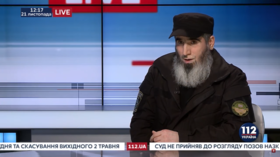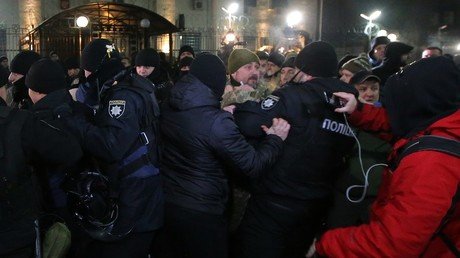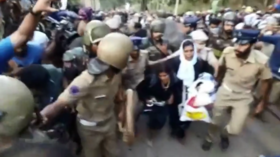Ukraine army’s Chechen allies openly admit having Islamic State links – report

Islamic State-trained militants are fighting alongside a state army in a European country, the Times reports – but that detail is buried in an article talking about how Putin is a common enemy of Ukrainians and Chechens.
Framed as an inside look at what’s driving Chechens to join Kiev’s “anti-terrorist operation” against the breakaway republics in the east of Ukraine, the Times article has a few juicy quotes from one Mansur, a member of a voluntary battalion made up of Chechens.
Putin is our common enemy… He brings only evil.
Author and veteran anti-Putin writer Marc Bennetts echoes the official message of Kiev and its Western allies, calling the eastern Ukrainian rebels “Kremlin-backed” and claiming Moscow is “preparing a full-scale invasion.”
He also mentions, once, midway through the text, that some of the Chechen fighters in Ukraine admit having trained with Islamic State (IS, formerly ISIS/ISIL) in Iraq and Syria. Kiev, he writes, has no official links to them, but has been criticized for turning a blind eye to their actions.
Formalities out of the way, the article gets on with more important things such as how the “Kremlin-installed” leader Ramzan Kadyrov is not representative of the Chechen people.
“We want the world to know that it wasn’t Chechens who attacked Ukraine but the Kremlin,” it quotes Mansur as saying. “Kadyrov and the Chechen people are very different things.”
Kadyrov, a vocal, over-the-top supporter of Putin and Russia’s fight against global terrorism, is not a popular figure in the West – he has been accused of human rights violations, blacklisted by the US, and generally described as Putin’s “attack dog.”
The Chechen battalion in Ukraine – known as the Sheikh Mansur battalion – operates effectively outside the law. Its leader, Muslim Cheberloevsky, says it’s not subordinate to the army or the police – which is a legal requirement for any paramilitary organization in the country.
Still, in a 2017 interview he spoke about having a great relationship with Kiev’s forces: “If there are difficulties in one area or another, they call us, and we help.”
This isn’t the first time that the Sheikh Mansur battalion’s links to IS have surfaced. In September, Ukraine extradited one of the group’s fighters to Russia, where he was wanted by the FSB for fighting on side of IS in Syria. Ukrainian nationalists, including some lawmakers, were outraged by Kiev’s decision to surrender an ally to the “aggressor country.”
Meanwhile, the Ukrainian army is set to receive $250mn worth of military aid from the US in 2019 – and with a history of the Pentagon losing track of weapon supplies and American arms turning up in terrorist hands, it will take close oversight – and, more importantly, willingness – on Washington’s part to prevent some of that aid from ending up with Kiev’s unofficial, IS-linked allies.
If you like this story, share it with a friend!















